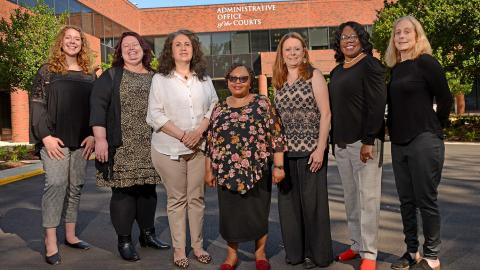North Carolina Human Trafficking Commission Hosts U.S. State Department Fellow
Article contents

The North Carolina Human Trafficking Commission (HTC), in partnership with Duke University, recently hosted a fellow from the U.S. State Department’s Hubert H. Humphrey Distinguished Fellowship Program focusing on human rights and social justice the week of May 8. The primary objective of this program is to enhance leadership skills among senior-level professionals who work on local and global human rights challenges and promote institutional change for the collective good.
Ms. Polo Chabane is director in the Human Rights Unit in the Ministry of Justice and Law in the Kingdom of Lesotho in South Africa. She holds a Master of Law degree with specialization in human rights which she obtained from the Center of Human Rights, University of Pretoria. In her official role, she advises the government on national and international legal issues. In her daily work, she interacts with development partners and various missions and/or embassies. She has led Lesotho delegations to various international conferences including the Human Rights Council.
During her spare time, Chabane voluntarily assists members of her community with their court cases and making referrals and aids in the protection of vulnerable groups. After the 3-day networking engagement with the HTC, Chabane traveled to Washington, D.C. for additional meetings.
More About
This year’s Human Rights and Social Justice cohort included 20 distinguished fellows who are working on topics including indigenous and ethnic minority rights, refugees and migration, women’s rights, and disability rights, among many others. Following a one-week program at Duke University, each fellow conducted a 3-day networking engagement with a host organization.
Fellows use this unique opportunity with a host organization to carry out some of the following activities:
- Observe programming and practices of leading organizations that work on human rights and social justice in the United States; Learn first-hand about the challenges to solving current human rights and social justice issues both in the U.S. and globally;
- Meet with an organization’s subject matter experts to discuss ideas about pertinent professional topics;
- Share their own work in the field of human rights and social justice, focusing on developing broad international networks of practice;
- Share professional perspective on projects and programming the host organization may be implementing and/or planning.
Professional host organizations benefit from hosting a Humphrey Distinguished Fellow by expanding their network with a senior individual with significant experience in the field as well as participating in a high-profile U.S. Department of State program. In some cases, a host’s time with visiting fellows may potentially lead to future collaborations or projects.